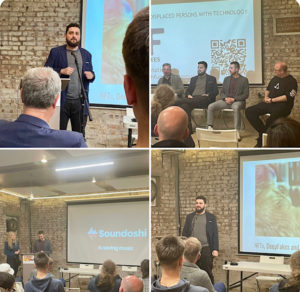
DeepFakes, NFTs and Creators’ Authentication
by Wael Elazab
The Cybersalon Deepfakes, NFTs and Creator Authentication event took place in Newspeak House in March, on the day when Deep Fakes of Zelensky as well as Putin were doing the rounds on social media. The timing was a coincidence, but it has demonstrated the ubiquity and risks in deep fakes around us on everyday basis. Digital reality has gotten soo good, we are now talking not about ‘uncanny valley’ (very similar but not quite there) but about ‘canny valley’, where faces created by AI are considered more friendly and attractive than just average human face.
Digital is spellbinding, a magic potion more widely available every day and with increasingly accessible, cheap ingredients. As such, any novice may wield its magic. No ethics necessary, just online tech tools and you can make yourself Deep Fake with visual and audio of anyone.
Cybersalon Collective, with Chair Eva Pascoe (hopefully not her Deep Fake), hosted panel guests, Caron-Jane Lyon, recipient of Arts Council Grant NFTs for Creative Industry; Stefan Lutschinger, Middlesex University Digital Media and Web3 lecturer; Richard Boase, blockchain game developer, and cofounder Block Dojo and Ninja Punk Girls; Łukasz Jęksa, Artur Polarny and Michal Scislowski of Soundoshi music streamer, as well as the founder of blockchain authentication service Galatea & Pygmalion, Baltazar Baechli.
Of the ideas among these heads, are not limited to, but include the following (Ts&Cs ‘ain’t seen nuthin’ yet): blockchain payment systems, NFT investments, tokenising music, scientific proof (the nerve!), certifiable authenticity protocols, blockchain enabled artwork provenance c/o blockcain, all of them under web 3.0, as are metaversities and metaverse.
Say metaverse one more time
Even Jules Winnfield can’t take out “metaverse”. A weighty expression on par with blockchain, for context used to illicit content, rather than mean something, metaverse and web 3.0 are not interchangeable. It’s the same for Internet and Web, as the latter is a service deploying the infrastructure of the former.
It’s like this, web 1.0 didn’t bother with who you were, because it couldn’t. Web 2.0 bothers us for everything, and your data is sought by e-companies, governments and state actors everywhere.
Web 3.0 is a bother to e-companies, as it challenges them for authenticity of product, it is also bothersome for pre-existing, established and protected financial systems. The fortification by the few, serve those few, and inherent restrictions keep the many at bay. The blockchain, for Richard Boase, founder of Ninja Punk Game blockchain game, is self-fulfilling. He explains the significance, in that, “BSV blockchain scales globally, with very low transaction fees,” meaning there’s sight of a future with, “A global economic platform, for everybody.”
Pascoe puts into words, that herself and the panel guests all think, “Many want an [economic] model that isn’t based on advertising,” she continues, “We’ve spent 20 years fighting dataholic Web advertising model, biased against the user, with all power to the data gatherer, and we’re still losing ground every day.” Web 2.0 gave us fast, accessible, high-capacity storage for our data, “The more data that gets created, the more data gets stolen. You can’t sneeze without your data being captured,” Pascoe continues, explaining, “[The blockchain model] has a reward structure, such that if you do your bit, some value come back. Let’s not get caught napping, again.” Soundoshi, from Poland, are aiming to use blockchain to ensure a fairer distribution of rewards to musicians, avoiding the skew to the big stars only. Galatea start up is looking to ensure true record of ownership of artworks or collectibles. This is missing today from provenance, as art galleries and valuating experts can chose to be ‘selective’ about sequential ownership record.
A more integrated future
“It’s a bit of a no-brainer for me,” says Boase, “A commercially connected internet environment … each website paying [a fraction] of a penny, and everyone operating in this super-economic and super-efficient environment, means the whole world gets loads more value.” Often, it doesn’t hurt to state the obvious, Boase continues, “We’re not choosing to build things on blockchain arbitrarily, we’re saying this is what the future’s going to be built on, so let’s start building now.”
Don’t be late to the coven, conjures Caron Lyon, as she casts, “For creatives, there’s a lot of tech exploding – Cardana, bitcoin, Ethereum – and many with layers.” For Lyon, remembering the cavalier reception of web 2.0, “There was a similar bemusement when social media arrived, to it [that we see now for web 3.0].” Lyon concludes, “It will start to make sense, and people who realise there’s something there, they will start seeing the dots and connecting the dots.”
The panel unanimously declare, we are pre-web 3.0 bubble, but we can see emergent components for the new, more collective and secure way of doing things online.





